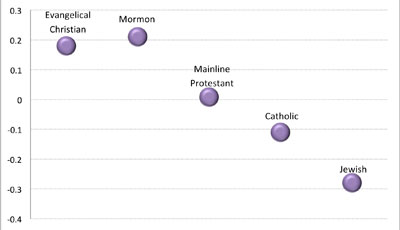It’s hard to miss that being Mormon is an issue in this presidential election. Gallup recently reported that nearly one in five Americans say that they would not vote for a Mormon—a sentiment most prevalent with Democrats and voters with low levels of education. The latter group, particularly whites and Latinos, are key to the GOP’s 2012 campaign. Add to that, many in Mitt Romney’s own party—particularly conservative Christians—see his religion as a liability.
Critical to these issues is the assumption that Mormon elected officials actually behave differently from those of other religious backgrounds. It turns out they do: when it comes to making policy, Mormons take a backseat to no one on conservative ideological purity.
We examined the voting records of every Mormon United States senator serving from 1976 through the early years of the 21st century. (The behavior of senators can give us a good approximation of the decisions that a future president might make because senators routinely deal with issues of national and international importance that governors and even members of the House of Representatives don’t.) There have been a total of 11 Mormon senators—eight Republicans and three Democrats—from seven states since 1976. On average, they are quite a bit more ideologically conservative than their non-Mormon colleagues.
Political science professors Jeffrey Lewis, Keith Pool and Howard Rosenthal developed a way to measure senatorial ideology by aggregating the liberal and conservative votes of each senator in each Congress dating back to the nation’s founding. The measure ranges from -1 for the most liberal voting record to 1 for the most conservative.
Conservative ideology score for senators from each religious group

For comparison purposes, then-Sen. Barack Obama’s ideology score in the 110th Congress was -0.44, making him the 18th most liberal member of the 100-member Senate. On the other side of the aisle, his opponent for the presidency in 2008, John McCain, had an ideological score of 0.41, making him the 32nd most conservative member of the Senate. (Vermont’s Bernie Sanders and Oklahoma’s Tom Coburn were the most liberal and conservative members, respectively, that year.)
Since 1976, Mormons average 0.21, firmly to the right of the moderate center point of zero. If you add the records of all other senators over this timespan together and average them, the number is -0.03, or just a tick to the left of center. If we restrict our analysis just to the Republican Party, we find that Mormons are a few notches to the right of their peers, registering an ideology score of 0.36, versus 0.31 for all other Republicans. Compare this with Republican evangelical Christian senators’ score of 0.42 and there is ample evidence of common ground between the two religious groupings. If religion were to influence a future Romney administration in the same manner as it has Mormon members of the Senate, then we should expect Romney to pursue a consistently conservative policy agenda, more or less in line with evangelicals.
Evangelical Christians, though, are less concerned about Romney’s overall ideology as they are about where he stands on the issues that are critically important to them. To understand this, we looked up every vote since 1976 on the “culture war” issues of abortion, contraception, gay and lesbian rights, women’s equality, and stem-cell research, and examined how Mormons compare with those of other faiths. We found that Mormons are much further to the right. On a scale of zero to 100, where 100 means a senator voted conservative 100 percent of the time on cultural issues, Mormons average a score of 86 percent, while all other senators average 48 percent. Evangelical Christian senators (of both parties) vote conservatively only 79 percent of the time on cultural issues. Even a high-profile Mormon Democrat such as Majority Leader Harry Reid has a mixed record on the hot-button issue of abortion, with a 50 percent rating from the conservative National Right to Life Committee, a score far to the right of most Democrats.

Among Republicans only, Mormons still outflank their colleagues, voting conservatively, on average, 94 percent of the time, compared with 73 percent for all other Republicans. Republican evangelical Christian senators voted conservatively 92 percent of the time on these issues, nearly identical but slightly less than their Mormon co-partisans.
The data imply that having a Mormon background produces a level of conservative ideological consistency in the Senate rivaled only by recent evangelical Christians within the Republican Party; concerns about Mitt Romney’s commitment to the conservative agenda due to his religion may be unfounded.
But this leaves open the question of whether religion indeed influences the conduct of presidents. Turns out, there is plenty of evidence to indicate that it does. Whether it’s John F. Kennedy carefully avoiding the appearance of entanglement with the Vatican, George W. Bush citing Jesus Christ as his favorite political philosopher, or Barack Obama absorbing the social justice and community-organizing ethos of his Southside Chicago congregation, the religious backgrounds of presidential candidates are a window into their values and policy preferences.
In Mitt Romney’s case, not only is he a privately devout Mormon, he has donated millions of dollars to his church and once served as a bishop in the Boston ward of the Church of Jesus Christ of Latter-day Saints. It is reasonable to conclude, then, that his Mormon faith will inform the decisions he makes if he becomes president, even if he is reluctant to openly discuss it.
This means that members of the Christian Right have little to fear in supporting a Mormon for president, if they believe he is motivated by his faith. For the left, though, matters of faith may be an important reason to question Romney’s “moderate” reputation.




